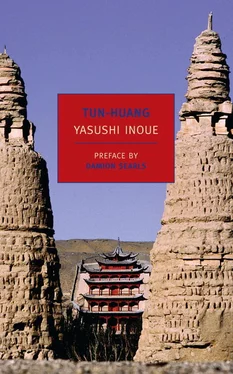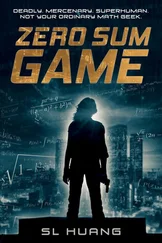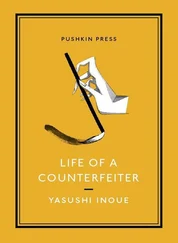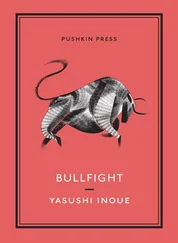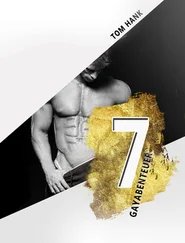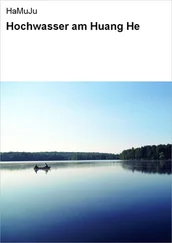“You miserable creatures! How long are you going to stand around like this? If you can’t afford to buy, then I’ll fix it so you can. How about a finger? A finger?”
The next instant the man’s knife glittered. The sound of the knife hitting the board resounded and, simultaneously, a cry which was neither a scream nor a moan escaped from the woman’s throat. When he saw blood spurting, Hsing-te thought the woman’s arm, which she had raised toward her head, had been cut off. But her arm was intact. Two fingertips of her left hand had been severed. The spectators were aghast and involuntarily drew back, widening the circle around the woman.
“All right, I’ll buy her.” Hsing-te called out before he could stop himself. “I’ll buy all of her.”
“Do you really mean it?” The man wanted to be sure. As this conversation took place, the woman suddenly sat up, supporting herself on the board with her bloody hand. With flushed cheeks she faced Hsing-te and said, “I’m sorry, but we will not sell all. Please don’t misjudge the women of Hsihsia. If you want to buy me, buy me piecemeal.” Then she lay down again. At first Hsing-te could not grasp the meaning behind the woman’s words. Then, realizing that she had misunderstood his intentions, he reassured her. “Oh, I mean to buy you, all right, but I have no personal designs on you. After I buy you, you’re free to go wherever you like.”
Hsing-te bargained with the man. Not much money was involved, and the two quickly agreed on a price. Hsing-te took out the sum asked by the man, and placing the coins on the board, ordered the woman to be freed.
Grasping the money greedily, the barbarian turned toward the woman and berated her furiously in a strange tongue. Slowly she rose from the board. Hsing-te made his way through the circle of spectators, who stood there amazed at the turn of events. He left the scene and walked away. When he had gone about fifty feet, Hsing-te heard someone calling him and he looked back. The woman came running toward him. She was now dressed in the rough clothes of North China, and her left hand was bandaged. As she approached, she said, “I don’t want you to spend money without giving something in return. Please take this. It’s all I have.”
So saying, she gave him a small piece of cloth. Her face was pale, no doubt from the loss of blood. Hsing-te unfolded the cloth and saw some strangely shaped symbols, resembling letters, written on it in three lines, ten symbols to a line.
“What is this?” he asked.
“I can’t read it either, but I think it is probably my name and birthplace. We have to have this in order to enter Urgai. I have no further use for it, so I’ll give it to you.”
“What is Urgai?”
“You haven’t heard of Urgai? Urgai is Urgai. It means ‘Jewelled City’. It’s the capital of Hsi-hsia.” The woman’s dark, deep-set eyes glittered as she spoke.
“And where is the barbarian from?” Hsing-te continued his questioning.
“He’s a Uighur. Of all scoundrels, he is the worst.” With that, she left the cloth in Hsing-te’s hand and quickly vanished into the crowd.
Hsing-te resumed walking. As he strode along, he realized that something had changed within him. He could not define the change, but somehow a part of his inner being had been completely altered. Hsing-te could not help thinking how ridiculous it had been for him to have been so unhappy about the Palace Examination just a short while before; in retrospect his despair over the lost chance seemed comical. The incident he had just witnessed was completely unrelated to academic learning or books. With his present limited knowledge, it was difficult for him to comprehend the meaning of that experience. And yet, what he had just seen and heard was of an intensity to shake him to the core of his being…in his way of thinking and in his outlook on life.
What had that young Hsi-hsia woman been thinking as she lay on that board? Did death mean nothing to her? What had made her object to selling her whole body? Was it from modesty? He could not possibly understand the mind of a man who would try to sell a human being piecemeal and could brutally chop off the woman’s fingertips. And she had not even flinched! These strange thoughts caught Hsing-te’s imagination with an overpowering force and drew him irresistibly into their web.
That night, after Hsing-te returned to his quarters, he reexamined the cloth, holding it up against the light. The few characters, only thirty in all, resembled Chinese, and yet they were different. He had never seen such ideographs before. So this was the writing of Hsi-hsia, the country that had produced that remarkable woman. This was the first inkling Hsing-te had had that the Hsi-hsia had their own writing system, used solely for communicating among themselves.
As he toyed with the cloth fragment, Hsing-te recalled the head official in the examination hall. He had been an elderly man, in his sixties, and Hsing-te felt that he must have been a very important personage to have been chosen to head the examination board. Judging from some brief remarks Hsing-te had overheard, the official’s knowledge appeared to be prodigious. Hsing-te had seen the man many times at the examination hall, and although he was not personally acquainted with him, he thought that the official might be able to decipher the strange symbols for him.
The next day, Hsing-te learned that the man he sought was the director of the Board of Procedures and went to see him. The shock he had received from missing the oral examination had strangely dissipated. On his third attempt, Hsing-te was allowed to see the director. He showed the elderly man the cloth and asked him to decipher the writing. The man stared at it with a surly expression and did not look up. Hsing-te explained how it had come into his hands. Only then did the director take his eyes off the cloth and remark, “No wonder I didn’t recognize the writing. I am familiar with Khitan and Uighur writing, but I was not aware that the Hsi-hsia had their own script. It must have been made up fairly recently. These letters are worthless imitations of our Chinese characters.”
Hsing-te countered, “Regardless of their worth, isn’t it a great achievement for a people to have their own writing? If Hsi-hsia becomes a great power in the future, then all the books which come from the west will be rewritten in Hsi-hsia. Culture, too, which until now has merely passed through Hsi-hsia, will be kept within its borders.”
The older man was silent for some time, and then remarked, “I don’t think we have much to be concerned about. It’s unlikely that Hsi-hsia will become very great.”
“But isn’t having their own writing proof that Hsi-hsia has in fact become a nation to contend with?”
“When barbarians begin to expand their territory, they immediately imitate other cultured nations and make a big display of themselves. The Hsi-hsia are just such barbarians. They are not a very superior race.”
“I beg to differ with you. I think the Hsi-hsia are a people which has the potential for becoming a very great nation. As Ho Liang predicted, someday Hsi-hsia will present a great threat to China,” said Hsing-te. He felt no compunction about expressing his thoughts. He felt more weight and substance behind his present words than he had felt in his dream. Even the common woman he had met at the market place had possessed that certain characteristic which would make Hsi-hsia a great power. That strange composure even in the face of death — certainly that attitude could not be hers alone. Just as her deep, dark eyes were a racial trait, so, too, that mysterious quality must be universal among the Hsi-hsia.
“In any case, I’m busy now.” The official spoke coldly and dismissed him. Hsing-te realized that he had offended the man. For all his efforts he left the office only with the knowledge that Hsi-hsia writing was still unknown in China.
Читать дальше
